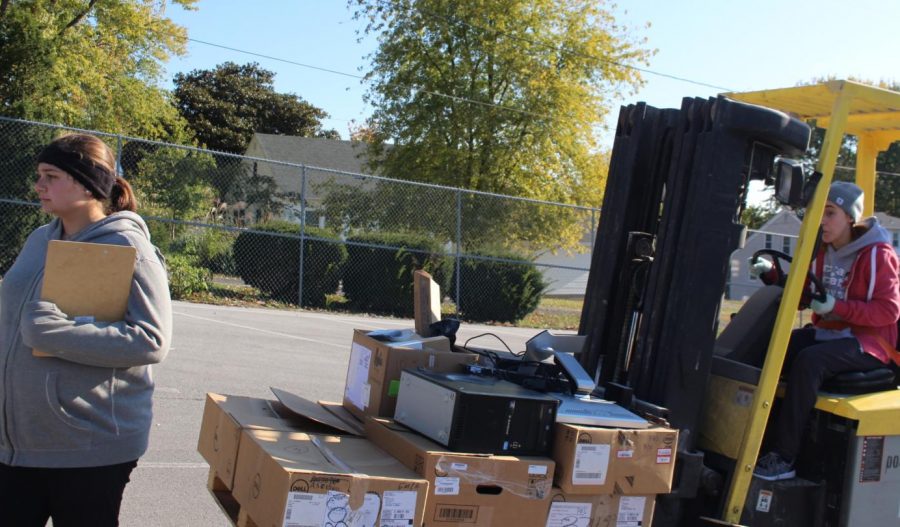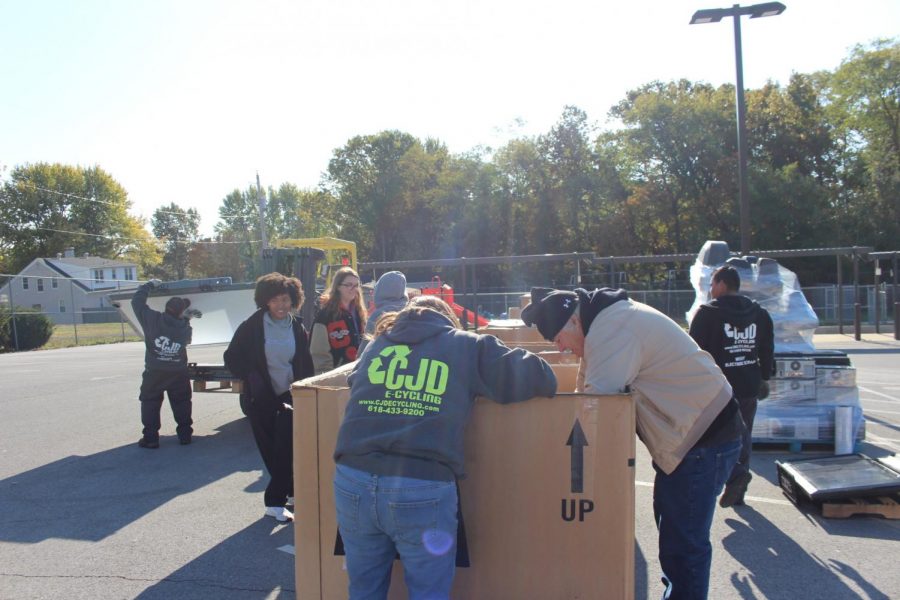English 101 Students Reflect On Service
Recycle For A Life Cycle
Jenna Bierman and Cierra Creason were two of the students who took part in the electronic recycling drive Nov. 2. Students in the Rhetoric and Composition class participated in the drive as part of a service-learning unit.
November 6, 2019
Community service gives local support to those who would not typically receive this type of project provided. While service projects can range from food pantry volunteers to individuals willing to plant a garden, a current and real project presents itself across the developed world. Electronic recycling, also known as e-cycling, not only provides a good service to a community for the present time but also reduces the growing pollutive footprint on the modern world.
E-Recycling drives pop up in various places, becoming more and more common as time passes. Companies dedicated to bettering the environment have taken on the role of collecting, separating, cleaning, and redistributing old electronics and electronic parts. Certain companies, such as CJD E-Cycling, accept “anything with a cord” when holding a drive. These drives allow communities that do not have regular access to a facility that properly disposes of electronics to bring old e-waste and properly discard items. According to new laws in Illinois and other states, sending electronics to landfills is illegal and recycling is mandatory. These steps in the positive direction help to ensure toxins are not being sent directly to landfills and harming the earth.
Most consumers who own electronics possess them for their convenience and luxury. Fascination with these products in this regard does not typically encourage the proper disposal of these items. Recycling is currently a conscious choice an individual has to make and work toward making a change. This is not the most convenient choice for most, and the greater population is known to choose the easier option. In this situation, not recycling is the route most choose to take. Quickly researching statistics in e-waste recycling unearths startlingly small percentages of those who actually make the effort to recycle. These numbers reinforce the need for communities to step up and promote recycling and share the consequences surrounding the alternative.
Countless benefits are to be had while discussing and conducting e-waste recycling. The reason known to most is saving the planet and the turtles. However, more significant arguments urge for preserving natural resources, reducing pollution, and generating jobs. Decreasing the size of landfills has proved to be a great focus on slowing climate change and pollution. The benefits do not end there. Electronics contain valuable materials including metals and recycling them allows for recovery of these materials and a reduction in product waste, where these elements can be reused.
Mark North, the Randolph County recycling coordinator, has provided intriguing information surrounding local recycling methods and habits. People in and around Chester are not avid recycling citizens, and the largest amount of those who take advantage of the recycling facilities are of the older age range. This poses a concern regarding the future of recycling in this area. Recycling has become a larger part of life in towns such as Steeleville, though. Collecting recycling alongside trash provides convenience and an increase in those who recycle. However, with convenience comes obstacles. Mr. North spoke of non-recyclable items that occasionally find themselves in the bags of materials. This causes hindrance to those sorting the materials and in the end, is not cost-effective. Certain types of recycling in Randolph County have been greatly reduced or completely done away with due to cost. Recycling materials can turn over profit so companies often end up paying to recycle instead of being able to provide an effective service to the world. This is a sad reality of recycling, and solutions need to be found. Advocacy for efficient and effective recycling that benefits the planet under our feet has become of great need in this area. Great attention has been brought to the fact that an e-recycle drive is much needed in Randolph County.
On Saturday, November 2nd, Chester High School’s own Rhetoric and Composition class hosted the sixth official e-recycling drive at Chester Grade School. Senior students excelling in the subject volunteered to be a part of the change. Starting early in the morning, everyone arrived for their respective shifts and proceeded to their previously determined roles. Some directed traffic into the parking lot, others surveyed the incoming cars and the rest physically collected and sorted the electronics. Each of these tasks proved challenging in its own way, whether it be the drivers disregarding the direction or the heavy lifting of the larger objects that had been brought to be recycled. Having a substantial number of people attending eased the stress of the drive as a whole, as there was no shortage of assistance and support.
While not all seniors were in attendance, those who arrived walked away with an experience that can be applied to other areas of life. Some students learned how impactful the ideals discussed in theory are in the real world, while others discovered what could be or could not be recycled and why. These life skills have the ability to modify a teenager’s outlook on the world. Seeing firsthand the influence and scale of these issues enforces the importance of recycling and caretaking of the earth we live on. Going forward in life with this experience under their belts, seniors can make educated decisions concerning careers, advocacy topics, and personal choices in everyday life with electronics.
Examining the statistics provided after the drive, the largest percentage of people who attended the drive found out from more conventional means of communication and advertisement. The physical newspaper and word of mouth spread the word of the e-recycling drive faster than social media or other means of communication. While all of these outlets for information proved to be effective, the most seemed to apply to a mostly older demographic. These individuals arrived with older and more well-used electronics than other attendees. This interesting and seemingly insignificant detail adds information to who typically recycles and how to reach larger audiences in the future. The items being dropped off by the older population had been utilized to their greatest extent, whereas the items dropped off by younger individuals were newer and were more easily replaceable. This also raises a question toward the electronics industry and other areas of consumer products. If the modern world is moving in the direction of constant updates and quickly discarding the former, what does that mean for the planet? Waste is now being created at a never-before-seen rate and humans across the world, both corporately and individually, need to consider the ramifications of the new lifestyle being adopted in the new century.
Because of the vast differences in materials used in most electronics, it can be difficult to properly dispose of and recycle these items correctly and efficiently. E-waste can consist of glass, plastic, and various metals. CJD E-cycling helps to keep electronics out of landfills in Illinois, where it is currently illegal to send these objects after use. Regarding the Chester e-recycle drive, CJD arrived with a truck and many organizational boxes and pallets to separate the incoming e-waste. Distinguishing between the types of electronics upon collection is not the end of the sorting and separation of materials, but it is a vital beginning step. After the array of devices and appliances are collected on-site, they are transported back to the main facilities. Here, the electronics themselves are separated into their respective materials and sometimes even shredded into minuscule pieces. These pieces can be mechanically processed and disassociated from one another by large magnets or by other means such as water technology. Once everything has been separated, cleaned, and prepared, the recycling company, CJD E-Cycling, would be able to distribute these parts of the recycled electronics and their hardware to be reused in new products. A mission of CJD’s company is to “keep as much as possible out of the landfills and put it back into our community to become new and refurbished materials.” Doing this benefits not only communities in respect to more materials for new goods, but reduces the pollution footprint from the electronics industry on the earth.
This year, the 75 cars that attended the e-cycling drive originated from a wide area surrounding Chester itself. Expectedly, the majority of people who turned up for the event were from Chester. Other areas of residence included Ellis Grove, Sparta, Steeleville, Columbia, Kaskaskia, Evansville, and an individual from Missouri. Rural towns such as those in the Chester area do not have immediate access to an e-cycle center, so hosting a drive in a local vicinity to those places allows the proper disposal of electronics that was otherwise unavailable.
Service projects and helping others always gives a new perspective on the topics discussed. Personally, my views on recycling and the need for preserving our planet were greatly reinforced during this e-cycle drive. I have always valued reducing, reusing, and recycling due to my love of nature, but knowing what could be in store in the future, not only for myself but for those around and after me, bred a sense of urgency. Seeing firsthand those who also cared about making a difference was a great thing to experience. The people bringing electronics genuinely cared enough to arrive early in the morning and properly discard their belongings. Other details of the drive itself that stuck with me include the joy of physically tossing the electronics into the tall cardboard bins because I was too short to set them on the bottom. I also enjoyed watching the struggle of others who tackled the task of carrying heavy or awkwardly-sized items to the pallets. In my future endeavors, I look forward to incorporating what I have learned from this class and expanding on my knowledge in the caretaking of our planet. Overall, making a difference in the community with my friends and classmates proved to be an enjoyable and impactful experience.
Electronic recycling drives provide numerous benefits not only to planet Earth and its inhabitants but also more immediately to those who properly discard of their electronics in ways that would otherwise be unavailable. Personal, as well as large scale, impacts are shown across the nation as more and more e-recycling drives are held.
Editor’s note: The e-cycling drive was held as a service-learning project for the Rhetoric & Composition class. This was the fifth time the dual-credit students wrote a reflection paper after conducting an e-cycling collection.


